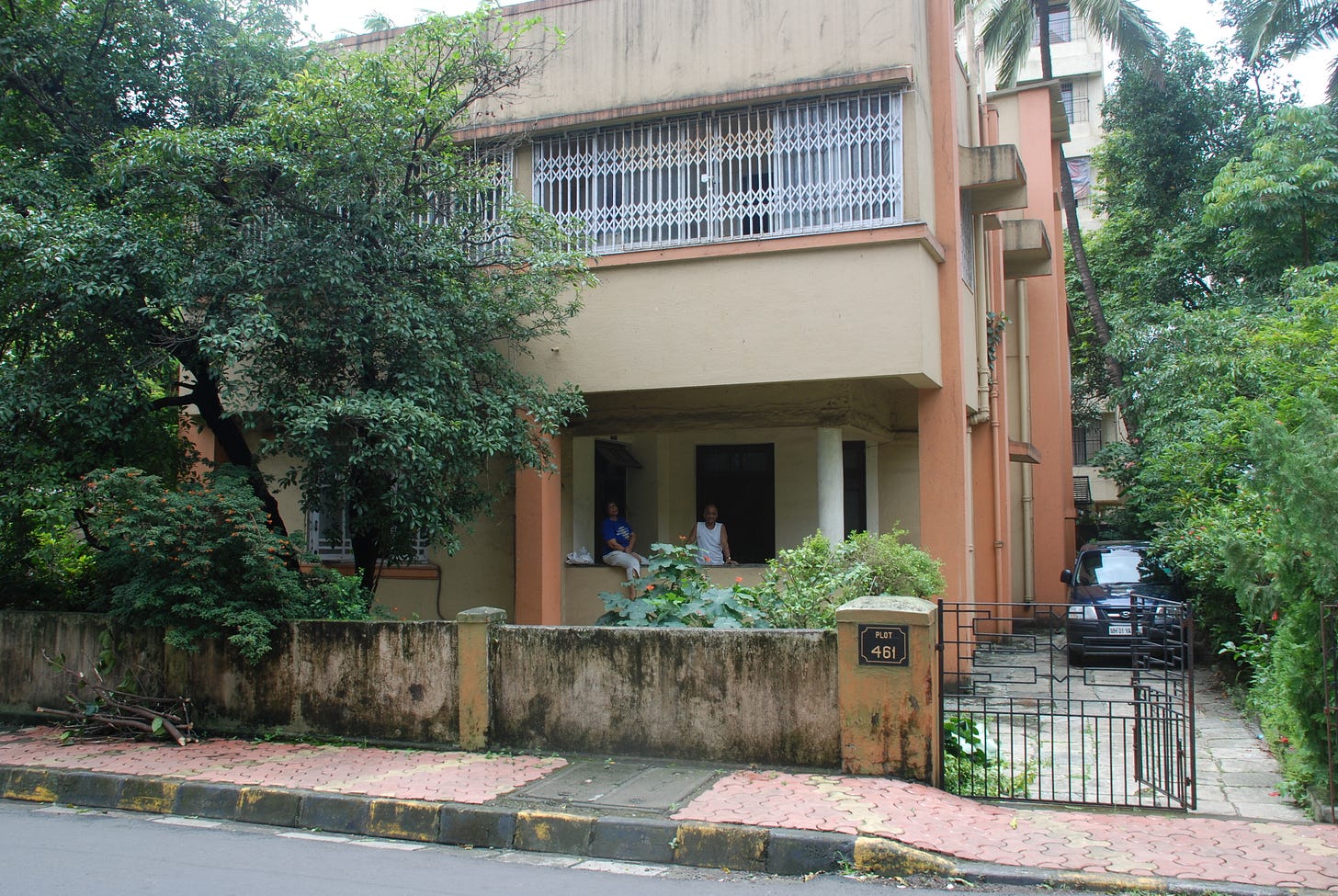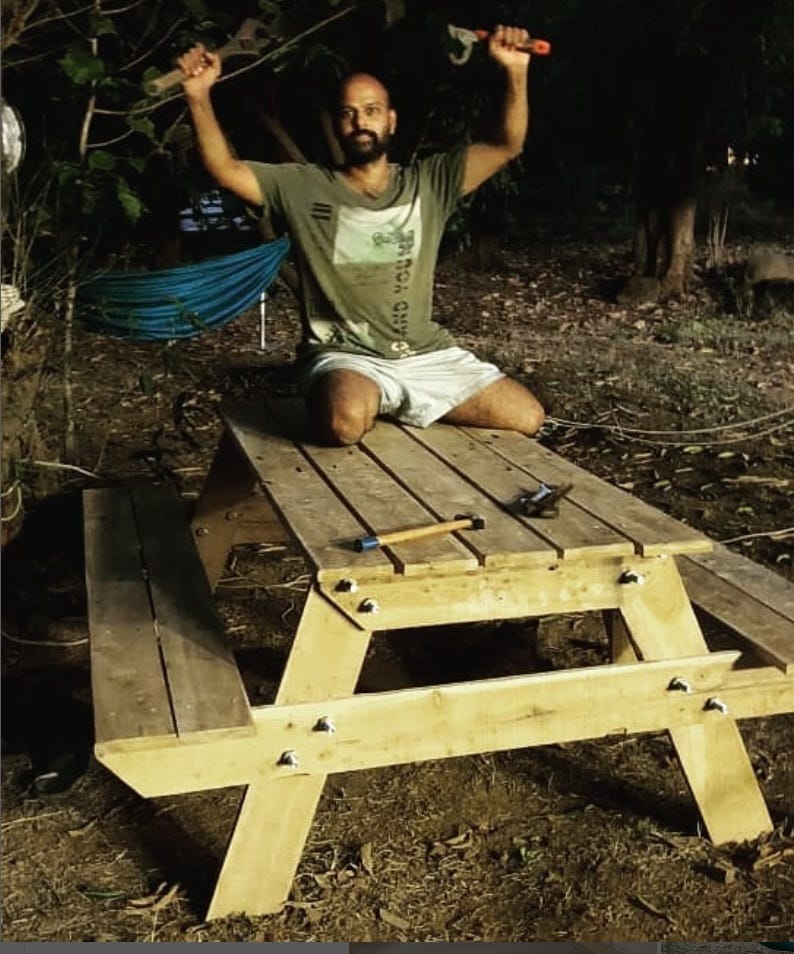If you are new here, please see my previous newsletter for context and the first story. This is the second story in The Unconventional Series: Folks Who Created Their Own Path featuring Viren Vaz, a 45-year-old, from Bombay who after working for 17 years in software development, quit his corporate life and became a nomadic wood artist and teacher starting V for Wood. He questioned the basic tenets of life - contentment, happiness, money, marriage, parenting, and attachment. He constantly redefines these concepts to live life on his terms, not society's.
Chapter 1 | I Want to Be Happy
“My mother has a lot of stories of what pain she had. But as far as I remember my early childhood was spent productively beating up my twin brothers and getting beaten up by my mother in return.”
Born in Chembur, Bombay in 1979, Viren was the naughtiest second child in a family of six with an older sister and twin younger brothers. His father Ronald hailed from Mangalore, Karnataka while his mother Jean was from Konkan, Maharashtra. The family resided in a lush green Catholic colony, where Viren spent most of his time playing outdoors.
"The local doctor always had tetanus injections ready for us," Viren chuckles. "Whenever we showed up, he’d just pull one out and give us a shot. We never needed to explain why we were there."
Viren's mother left her job as a personal secretary when he was three to manage the household, while his father worked at BASF, a German chemical company, for 35 years. Though his father provided financial stability, he was seldom home. Viren was brought up by his mother and Nan (maternal grandma) who lived nearby. "Father was always working, and on weekends he would be outside," Viren explains. "I later learned he’d visit local vendors, smoke cigarettes, and relax. I can understand now as a parent, how crazy was it for him. Four Children in the house, three of them of similar age and are boys."
Summers were spent in his father's ancestral village, Thottam, in Udupi, Mangalore. With the house by the sea and an extended family that brought along 12-15 children, these vacations were filled with exploration. Viren fondly remembers walking along the deserted beach, collecting shells and peculiar stones. "It was like having a private beach," he says. "Dogs from neighbouring compounds would join me, there was no concrete road or defined path and I’d just walk in the sand. I've always been a bit of a loner."
From childhood, Viren was fascinated by nature, birds, spending hot afternoons digging in his nan's garden to uncover what lay beneath. To nurture this interest, his father bought him an illustrated bird guide by Salim Ali and a pair of binoculars.
Viren attended the boys convent school, Our Lady of Perpetual Succour, in Chembur, a melting pot of social strata. From kids who could afford lavish birthday treats to those with frayed collars, there was no classism as exists now.
Academically, Viren excelled in math and science because it made sense to him but scored terrible marks in history and geography. His twin brothers were not as good as him in academics. To protect his other sons from being hurt, his father asked Viren not to boast about his achievements at home. This request fueled his resentment, often resulting in him bullying his brothers. In recent years, Viren has worked on mending these relationships, realizing the unfairness of his father's request. He recalls a memory
"I scored full marks in math across the sixth grade. I was so proud and wanted to tell my mother first. But my brothers had already told her," he recalls. "For decades, I thought they were stealing my joy. Only recently did I realize they were just as proud of me and wanted to share the news too. It's scary how my perception affected my relationships for so long."
During his school years, Viren never thought much about the future. He simply knew he had to do what was expected. When asked what he wanted to be, he'd reply, "I want to be happy." During this time, a new house was being built on top of his nan's house, exposing him to woodwork. "I enjoyed working with the carpenter," he says. "It was a way to express myself, to bring to life the things in my head and mimic the beauty around me."
At thirteen, Viren spent hours sharpening screwdrivers on a stone sharpener and carving small flowers out of discarded wood pieces lying around and giving them to his potential girlfriends. His father bought him a manual drill machine. With it, Viren would drill holes in wood, trying to fit pieces together. Working with plywood, the only material readily available to him was particularly challenging. "Plywood is terrible for carving. It keeps breaking and splitting. I don’t know how I stuck with it.” Craft without knowledge or guidance needs determination, and that’s something children have.
One memorable outing was when his father took him to 'Lohar Chaal,' a massive hardware market in Bombay, to buy tools. However, Viren didn’t use these tools for many years because he didn’t know how. For instance, sharpening a chisel requires understanding what sharpness means and the technique to achieve it. Carpenters were unwilling to teach these skills, either due to lack of time, fear of losing their jobs, or the absence of a formal apprenticeship process. Viren mostly learned by cutting his skin.
In the 10th standard (1995), Viren scored 76% and chose to study science in junior college (11th and 12th standard in the state board) because that’s what is done and he had no clue about what he wanted to be. Most of his peers aspired to traditional 9-to-5 jobs as doctors, engineers, or managers, and the common path was to choose between arts, commerce, or science after the 10th standard. It was only after the 12th standard that one decided on a specific career. Interestingly, Mumbai being the entertainment capital of South Asia, the show business didn’t seem to impact their ambitions. "I don’t remember anyone in my school wanting to become an actor or actress," Viren recalls. The alternative was studying in the U.S., but he never bothered to understand why others chose that path.
P.S: If you liked what you read please show your appreciation by filling the heart below with some love.






Loved reading this! Great work, Aditi! 💛
Nice, waiting for the next